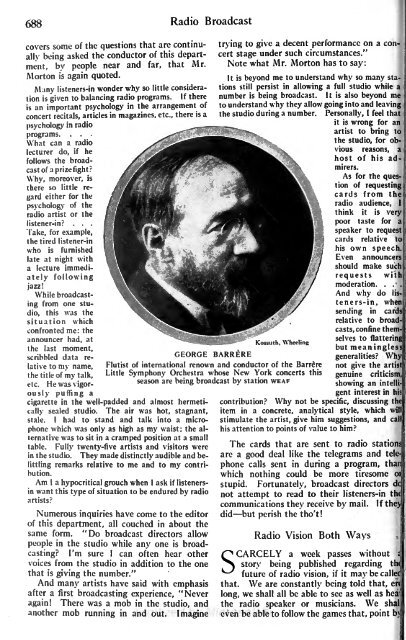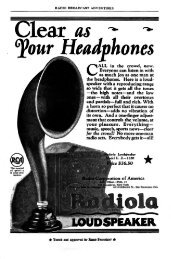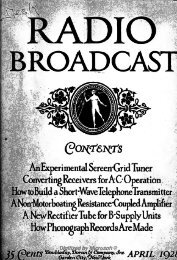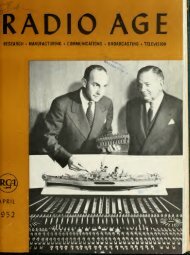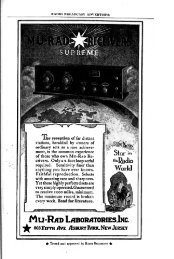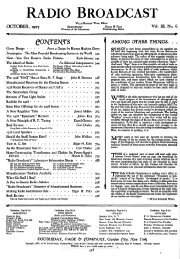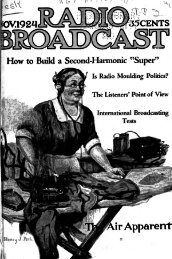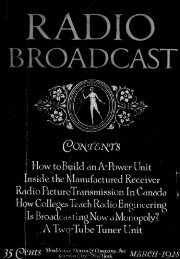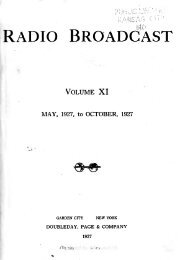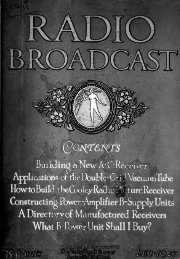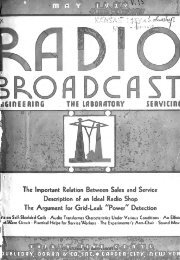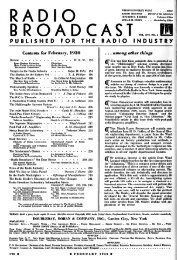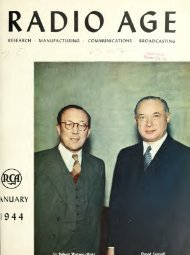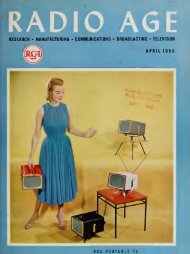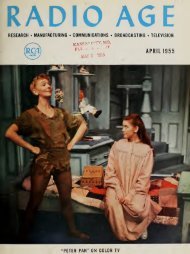Radio Broadcast - 1925, February - 113 Pages ... - VacuumTubeEra
Radio Broadcast - 1925, February - 113 Pages ... - VacuumTubeEra
Radio Broadcast - 1925, February - 113 Pages ... - VacuumTubeEra
You also want an ePaper? Increase the reach of your titles
YUMPU automatically turns print PDFs into web optimized ePapers that Google loves.
688 <strong>Radio</strong> <strong>Broadcast</strong><br />
covers some of the questions that are continually<br />
being asked the conductor of this department,<br />
by people near and far, that Mr.<br />
Morton is again quoted.<br />
Many Hsteners-in wonder why so little consideration<br />
is given to balancing radio programs. If there<br />
is an important psychology in the arrangement of<br />
concert recitals, articles in magazines, etc., there is a<br />
psychology in radio<br />
. . .<br />
programs.<br />
What can a radio<br />
lecturer do, if he<br />
follows the broadcast<br />
of a prize fight<br />
Why, moreover, is<br />
there so little regard<br />
either for the<br />
psychology of the<br />
radio artist or the<br />
listener-in . . .<br />
Take, for example,<br />
the tired listener-in<br />
who is furnished<br />
late at night with<br />
a lecture immediately<br />
following<br />
jazz!<br />
While broadcasting<br />
from one studio,<br />
this was the<br />
situation which<br />
confronted me: the<br />
announcer had, at<br />
the last moment,<br />
scribbled data relative<br />
to my name,<br />
the title of my talk,<br />
etc. He was vigorously<br />
puffing a<br />
cigarette in the well-padded and almost hermetically<br />
sealed studio. The air was hot, stagnant,<br />
stale. I had to stand and talk into a microphone<br />
which was only as high as my waist; the alternative<br />
was to sit in a cramped position at a small<br />
table. Fully twenty-five artists and visitors were<br />
in the studio. They made distinctly audible and belittling<br />
remarks relative to me and to my contribution.<br />
Am I a hypocritical grouch when I ask if listenersin<br />
want this type of situation to be endured by radio<br />
artists<br />
Numerous inquiries have come to the editor<br />
of this department, all couched in about the<br />
same form. "Do broadcast directors allow<br />
people in the studio while any one is broadcasting<br />
I'm sure I can often hear other<br />
voices from the studio in addition to the one<br />
that is<br />
giving the number."<br />
And many artists have said with emphasis<br />
after a first broadcasting experience, "Never<br />
again! There was a mob in the studio, and<br />
another mob running in and out. Imagine<br />
trying to give a decent performance on a concert<br />
stage under such circumstances."<br />
Note what Mr. Morton has to say:<br />
It is beyond me to understand why so many stations<br />
still persist in allowing a full studio while a<br />
number is being broadcast. It is also beyond me<br />
to understand why they allow going into and lea\ ing<br />
the studio during a number. Personally,<br />
I feel that<br />
it is<br />
wrong for an<br />
artist to bring to<br />
the studio, for<br />
obvious<br />
reasons, a<br />
host of his admirers.<br />
As for the question<br />
of requesting<br />
cards from the<br />
radio audience,<br />
think it is<br />
very<br />
poor taste for<br />
speaker to requesl<br />
cards relative to<br />
his own speech<br />
Even announcers<br />
should make such<br />
requests with<br />
moderation. .<br />
And why do listeners-in,<br />
when<br />
sending in cards<br />
relative to broadcasts,<br />
confine them-J<br />
selves to flattering<br />
Kossuth, Wheeling<br />
but meaningless<br />
GEORGE BARRERE<br />
generalities Why<br />
Flutist of international renown and conductor of the Barrere not give the artist<br />
Little Symphony Orchestra whose New York concerts this<br />
season are being broadcast by station WEAF genuine criticism,<br />
showing an intelligent<br />
interest in his<br />
contribution Why not be specific, discussing the<br />
item in a concrete, analytical style, which wil<br />
stimulate the artist, give him suggestions, and call<br />
his attention to points of value to him<br />
The cards that are sent to radio stations<br />
are a good deal like the telegrams and tele<br />
phone calls sent in during a program, than<br />
which nothing could be more tiresome 01<br />
stupid. Fortunately, broadcast directors d(<br />
not attempt to read to their listeners-in th(<br />
communications they receive by mail. If they<br />
did but perish the tho't!<br />
<strong>Radio</strong> Vision<br />
Both Ways<br />
O CARCELY a week passes without<br />
^S story being published regarding the<br />
^ future of radio vision, if it may be callec<br />
that. We are constantly being told that, eft<br />
long, we shall all be able to see as well as heai<br />
the radio speaker or musicians. We shaJ|<br />
even be able to follow the games that, point bj


